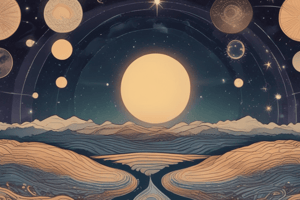Podcast
Questions and Answers
What causes a lunar eclipse to occur?
What causes a lunar eclipse to occur?
- The Earth moving into the Sun's shadow
- The Moon moving into the Earth's shadow (correct)
- The Earth moving into the Moon's shadow
- The Moon moving into the Sun's shadow
When does a lunar eclipse usually happen?
When does a lunar eclipse usually happen?
- Approximately every week
- Approximately every year
- Approximately every decade
- Approximately every six months (correct)
What alignment is necessary for a lunar eclipse to occur?
What alignment is necessary for a lunar eclipse to occur?
- Sun, Earth, and Moon aligned with Earth between the other two (correct)
- Sun, Venus, and Moon aligned with Venus between the other two
- Sun, Jupiter, and Moon aligned with Jupiter between the other two
- Sun, Mars, and Moon aligned with Mars between the other two
Why does a totally eclipsed Moon take on a reddish color?
Why does a totally eclipsed Moon take on a reddish color?
How does the duration of a total lunar eclipse compare to that of a total solar eclipse?
How does the duration of a total lunar eclipse compare to that of a total solar eclipse?
During a lunar eclipse, the Moon moves into the Earth's shadow, causing it to darken.
During a lunar eclipse, the Moon moves into the Earth's shadow, causing it to darken.
A lunar eclipse can happen during either a full moon or a new moon phase.
A lunar eclipse can happen during either a full moon or a new moon phase.
The reddish color of a totally eclipsed Moon is caused by the reflection of sunlight from the lunar surface.
The reddish color of a totally eclipsed Moon is caused by the reflection of sunlight from the lunar surface.
A total lunar eclipse can last up to nearly two hours, longer than a total solar eclipse.
A total lunar eclipse can last up to nearly two hours, longer than a total solar eclipse.
Solar eclipses can be viewed from anywhere on the night side of Earth, unlike lunar eclipses.
Solar eclipses can be viewed from anywhere on the night side of Earth, unlike lunar eclipses.
Flashcards are hidden until you start studying




